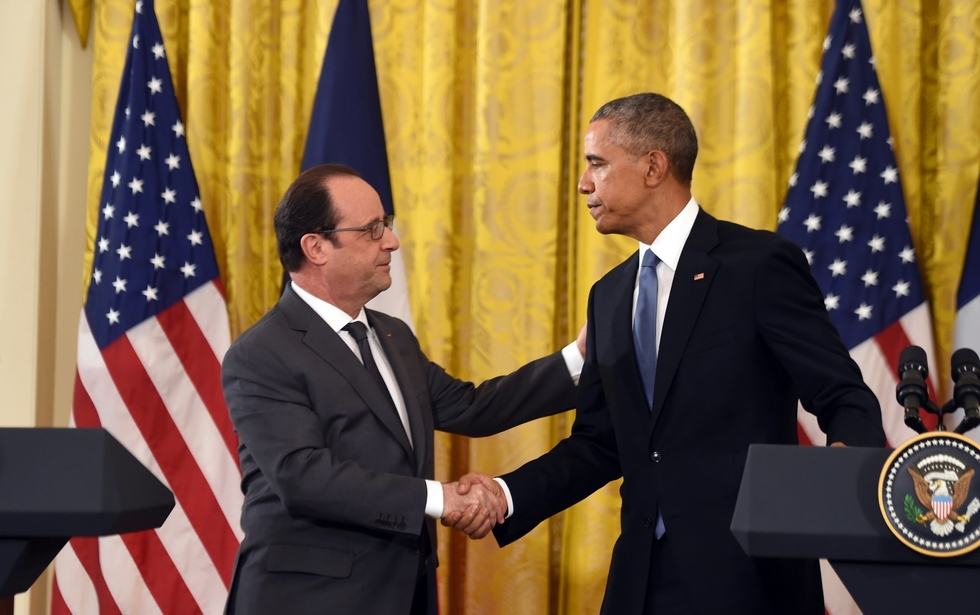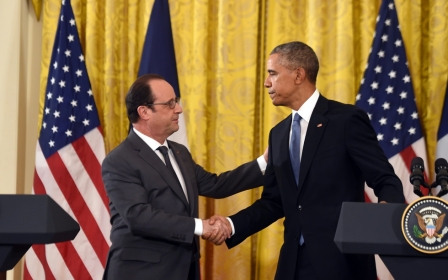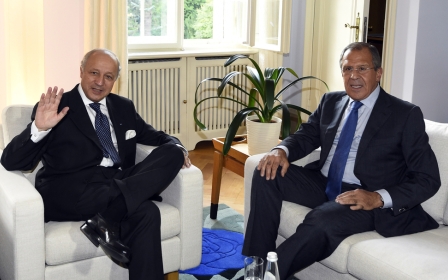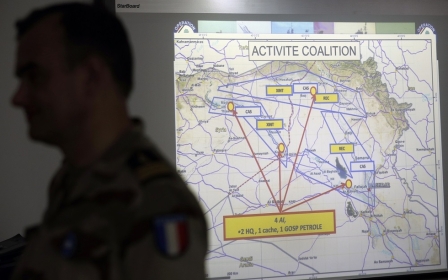ANALYSIS: Obama and Hollande’s flowery language masks weak strategy

NEW YORK, United States – Talks this week between French President Francois Hollande and his US counterpart, Barack Obama, displayed heavy symbolism of two allies united against Islamic State (IS) after the group shed blood on the streets of Paris earlier this month.
But analysts point to a lack of new commitments in battling IS, an ongoing rift over Syrian President Bashar al-Assad remaining in power and Turkey’s downing of a Russian warplane making a challenging situation even tougher.
“France and the US are close enough allies that it was always going to be smiles and talk of a strong relationship – but that doesn’t mean that Hollande walked away with anything beyond soothing words,” Jonathan Cristol, a scholar at the World Policy Institute think tank told MEE.
After meeting at the White House on Tuesday, Obama praised France as America’s “oldest ally” and said he was heartbroken by the IS gun and bomb attacks on Paris that claimed 130 lives on 13 November.
He described the two nations as friends “no matter what”. The caliphate-building religious fighters who occupy swathes of Iraq and Syria “must be destroyed, and we must do it together,” Obama told reporters on Tuesday.
The US-led bombing campaign had already unleashed more than 8,000 airstrikes on IS targets in Iraq and Syria, he added. France and the US were “stepping up that coordination” and must do “even more together”.
He also announced plans to boost support in “airlift and intelligence” to France and other US allies in Africa.
Hollande said the two leaders would “scale up our strikes both in Syria and in Iraq” and “broaden our scope, to strengthen our intelligence-sharing regarding the targets we must aim at”. Neither leader mentioned deploying ground troops.
Strong words, little substance
Analysts pointed to powerful language that lacked substance.
For Alex Vatanka, a scholar at the Washington-based Middle East Institute, a think tank, Hollande sought firmer commitments from Obama in tackling IS and may have “wasted his time” taking the 6,000km trip.
“As much as Obama sympathises with the French over the Paris attacks, he has not come out of the adopted policy he has had for four and a half years, of extreme caution when dealing with the Syrian file,” Vatanka told MEE.
“Obama’s gradual approach to fighting IS has left everyone else wondering who can fill the vacuum that is left. The French can’t do it on their own. The question is, can Russia and the Europeans come together to replace a role that has historically been played by the US?”
Hollande has scheduled to meet Russian President Vladimir Putin in Moscow on Thursday as part of his diplomatic effort to build support for intensifying the anti-IS campaign following the attacks on Paris eateries, a concert hall and outside a soccer stadium.
International cooperation on Syria continues to be hampered by disagreements between the main powers that are involved militarily. Russia and Iran support Assad, while the US and some European and Arab states say he must leave as part of a political transition.
The White House has expressed deep scepticisms of Putin’s motivations, given his longstanding support for Assad, and has accused Russia of bolstering the Syrian leader and bombing “moderate” rebel groups instead of IS fighters.
The military planning comes amid a parallel diplomatic effort to ease Assad from office. Moscow agrees in principle to UN-supervised elections within 18 months but continues to resist efforts to explicitly remove Assad.
According to John Quigley, a law professor at Ohio State University, Hollande wants to strengthen the fight against IS by boosting cooperation between the West and Russia and Iran, despite their contrasting agendas.
“After the Paris attack, France wants to go directly at IS, even at the cost of leaving the Syrian government in power,” Quigley told MEE.
“Added to this, Putin makes the compelling case that Syria is better off with Assad in power, rather than without. Because if Assad goes, nobody knows exactly what will happen, and we could very well have another Libya or Iraq.”
France says that for closer coordination with Russia to occur, Moscow must stop Assad from bombing civilians, focus its strikes solely on IS and other hardliners and help find a political solution without Assad.
Closer cooperation between France and Russia
A senior French official told Reuters that Paris was under no illusion that getting Putin to coordinate more closely would be easy. As well as the Paris attacks, IS claims to have bombed a Russian plane in Egypt’s Sinai Peninsula last month, killing 224 people.
“After the recent IS attacks, Paris and Moscow are closer together now in their perceptions of IS as the top long-term priority in Syria, regardless of what happens to Assad. The US will eventually move in that direction, it’s just not there yet,” Cristol told MEE.
“Hollande sought to bring Russia and the US closer together in working against IS. But even after the Paris attacks, the US lacks the political will to do much more than it’s doing and certainly not a substantial deployment of ground troops.”
Hollande’s meetings this week took place against a backdrop of Turkey, a NATO member, shooting down a Russian warplane near the Syrian border on Tuesday, underscoring the complex military landscape in Syria.
Tensions have escalated between Moscow and Ankara, with Putin describing the downing of the plane as a “stab in the back,” and warning of serious consequences. The US, the UN and the European Union have appealed for calm.
According to Cristol, the incident makes Hollande’s diplomatic effort more challenging.
“After its jet was shot down by NATO-member Turkey, Russia is less likely to overtly cooperate more with Western allies,” he said. “But it only pushes back the timeline, it doesn’t change the threat that IS poses to every actor, nor does it change the complicated dynamics of this war.”
New MEE newsletter: Jerusalem Dispatch
Sign up to get the latest insights and analysis on Israel-Palestine, alongside Turkey Unpacked and other MEE newsletters
Middle East Eye delivers independent and unrivalled coverage and analysis of the Middle East, North Africa and beyond. To learn more about republishing this content and the associated fees, please fill out this form. More about MEE can be found here.




